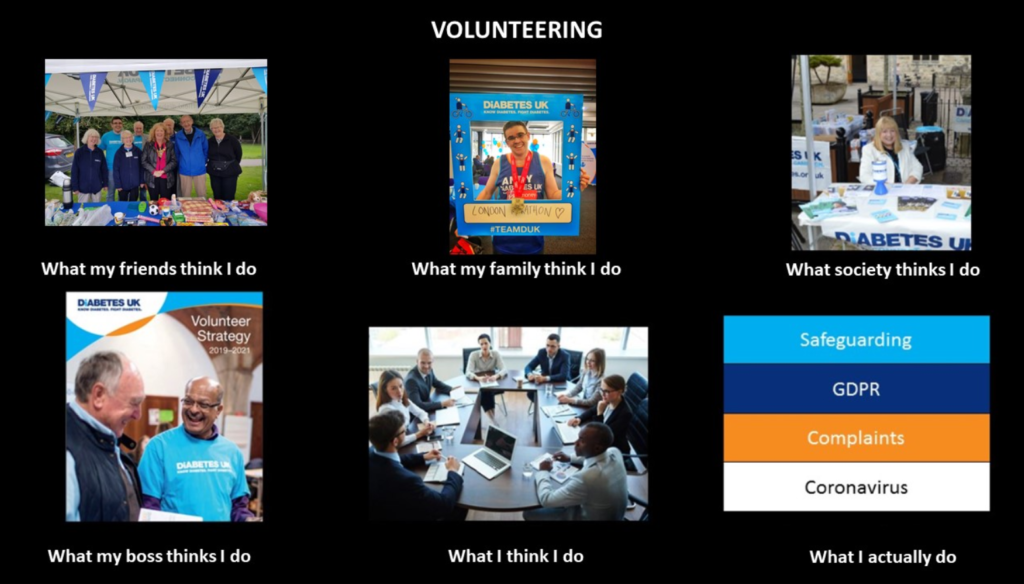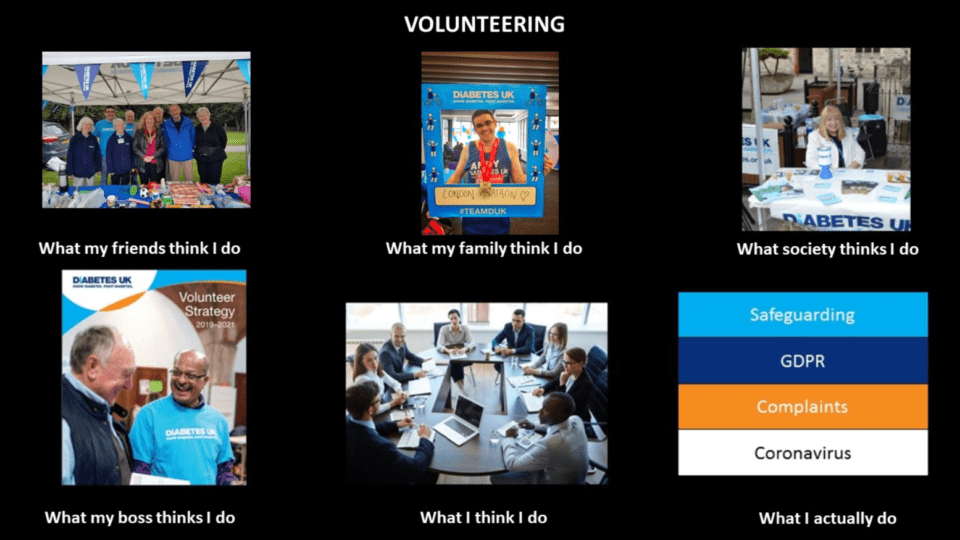Andy Broomhead is Head of Volunteering at Diabetes UK
At the end of every week I email all our volunteering colleagues with a round up of things they may need to do, read or should be aware of outside Diabetes UK. It’s a good way to put everything in one place and balances the inevitable asks with a little bit of levity and humour – I’m not one for taking things too seriously where we can avoid it. I think it’s generally well received, more so after I updated the format in response to calls from some volunteer managers to include “more memes please?”
This week I shared this with the team:

It got me thinking about the perception of working in volunteering versus some of the more practical elements we all encounter. Before I go any further, I should probably ‘fess up that before I started working at Diabetes UK I probably had a fairly narrow view of what volunteering meant as a career.
Let’s take a minute to run through these pictures, starting with the top row. My friends and family probably have a very specific idea about what I do based on my previous experience as an actual volunteer. My daughter used to come along and help on stalls, and when we talk about somebody needing a volunteer for something, she points at me because “that’s what Daddy does”. It’s hard to explain that your job is often so far removed from what volunteers do and in my case involves a lot of train travel and saying “can you hear me?” on Skype calls.
As for society, I’m not sure we’ll ever completely break that perception that volunteering is first or foremost standing somewhere with a collection tin. Nor do I necessarily think we should try and entirely sever that link. We might call it fundraising, but the tins and buckets don’t hold themselves or have those conversations with the public about our cause. While volunteering is so much richer than this, and if we want more people to be part of what we do, we definitely have a responsibility to talk more about all our opportunities, I still think it’s many people’s first impression of what we do.
In my role, it’s rare that I find myself in any of the situations in any of the top pictures any more. I do make sure I get out to visit volunteers and our local groups regularly, as well as attending as many of our networking events and conferences as possible, but running a stand or holding a collection tin is a much more infrequent event.
Let’s look at the bottom row. It’s wholly unfair to suggest that my (wonderful) boss thinks I only do one thing, but it’s a meme innit? I’m lucky that she understands the complexities and variation that comes with my job and supports me in all of the challenges that it throws up. I picked that picture because I think there rightly is that expectation that I’m looking at how volunteering becomes a stronger part of everything we do at Diabetes UK.
What I think I do… I won’t lie – it involves a lot of meetings. No, I mean a LOT of meetings. And a lot of travel. No, I mean… well, you get the point. I’m very lucky that my role is home-based, but it does mean days in the office can often be back-to-back-to-back as you try and shuffle your diary to see people face-to-face where you can. It’s not uncommon to balancing a sandwich and a half-drunk coffee on my laptop as I go from one room to another.
What do I actually do? It’s been one of those periods where it feels like the 9–5 (ha!) has been dominated by some of the more detailed aspects of my role. As we continue to ensure we have the most appropriate and safest recruitment practices in place when it comes to our volunteers, there are inevitably safeguarding questions that pop up. I’d be surprised to hear of any volunteer manager who couldn’t relate to that. Similarly, when you’re dealing with volunteers’ information you end up having a lot of GDPR conversations.
As hard as we try, we don’t always get things right and my job means I’m the first escalation point for some of the more involved complaints we might receive. I spoke at the AVM conference in November about this – we don’t get a lot of volunteering-related complaints, it’s just the ones that we do get often need more thought and attention and when you get a couple at once it can feel like it’s all you’re doing. Coronavirus is just the icing on the cake. I imagine it’s caught all of us off-guard to a large degree and having to be able to adapt and respond as information changes means it’s a large focus of our time.
This is the most varied and complex job I’ve ever had, but it’s also the most rewarding. It’s tough to balance that societal perception that it’s easy (and we’re all working for free) with the difficulties that sometimes come along. It’s also hard to reconcile how quickly and immediately volunteers want or need information with the wider considerations that we need to take into account. Providing a knee-jerk response to one volunteer can feel like we’re providing the best service possible, but sometimes taking a day to think about how one problem (e.g. coronavirus) can affect all your volunteers and putting together a more concerted response is better in the long run. Overall, I think the perception of volunteering is that it’s a never-ending stream of happy, sunny, easily organised events that run seamlessly. And it often is. But the bits that are hidden are those that often take a huge amount of time and effort, sometimes even just to share what feels like the simplest of messages.





